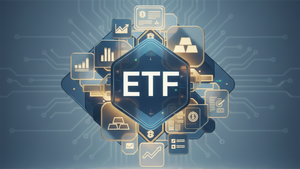
The financial world witnessed a pivotal moment today with the official launch of the REX-Osprey Dogecoin ETF (DOJE) on U.S. exchanges. This landmark development introduces the first U.S.-listed exchange-traded fund offering spot exposure to Dogecoin (DOGE) and, significantly, the first regulated product dedicated to a memecoin. The DOJE ETF’s debut is poised to unlock substantial institutional capital and provide retail investors with a streamlined, regulated pathway into the volatile yet increasingly legitimized Dogecoin ecosystem, fundamentally altering perceptions of digital assets in traditional finance.
This groundbreaking product, a collaborative effort between REX Shares and Osprey Funds, signals a maturation point for the broader cryptocurrency market, extending regulatory acceptance beyond Bitcoin and Ethereum to embrace even the most unconventional digital assets. Its unique structure and approval under the Investment Company Act of 1940 circumvent traditional regulatory hurdles, setting a precedent that could reshape the future of crypto investment products and catalyze further innovation in the decentralized finance space.
A Regulatory Breakthrough: The DOJE ETF's Innovative Structure and Path to Market
The REX-Osprey Dogecoin ETF (DOJE) officially commenced trading on U.S. exchanges on Thursday, September 18, 2025, marking a significant milestone for the digital asset market. This pioneering ETF is meticulously structured to offer investors exposure to Dogecoin's price movements without the complexities of direct cryptocurrency ownership. At its core, the fund intends to allocate at least 80% of its assets to Dogecoin or related financial instruments, which can encompass direct holdings, futures contracts, and swaps designed to track DOGE's performance. Critically, reports detail a structure comprising "80% DOGE exposure via futures, 20% Treasuries," with the remaining portion of the fund's assets held in U.S. Treasury securities or cash equivalents to ensure liquidity and operational support. This innovative approach leverages a Cayman Islands subsidiary to manage Dogecoin positions, effectively navigating U.S. regulatory frameworks and bypassing direct investment restrictions.
A cornerstone of the DOJE ETF's successful launch is its approval under the Investment Company Act of 1940 (the "1940 Act"). This strategic regulatory pathway allowed REX-Osprey to circumvent the more arduous and often prolonged review process typically associated with the Securities Act of 1933, which has historically governed most spot Bitcoin and Ethereum ETFs. The significance of this approval cannot be overstated. It functions as a regulatory workaround, akin to a mutual fund, employing derivatives—often through its Cayman Islands subsidiary—to bypass traditional SEC hurdles. This innovative legal strategy negated the need for a formal 19b-4 exchange rule change, significantly accelerating its market debut and providing a blueprint for future crypto-related investment vehicles.
The implications for mainstream financial markets and Dogecoin's legitimacy are profound. This launch formally integrates a memecoin into the regulated ETF market, signaling a transformation of Dogecoin from a niche internet phenomenon into a recognized mainstream asset. By providing a regulated investment vehicle, the DOJE ETF aims to attract a broader spectrum of investors, including institutional players and retail enthusiasts who might have been deterred by the perceived risks and complexities of direct cryptocurrency ownership. This accessibility is anticipated to unlock substantial capital flows into the Dogecoin ecosystem and potentially the wider altcoin market. The successful leveraging of the 1940 Act by REX-Osprey also sets a powerful precedent, potentially paving the way for similar offerings focused on other altcoins and memecoins, indicating a significant shift in how digital assets are categorized and integrated into traditional financial markets.
The journey to this launch saw consistent anticipation throughout early September 2025, with an effective date initially projected around September 9 or 11. However, the official trading debut was confirmed for Thursday, September 18, 2025. This followed REX-Osprey's prior success with the REX-Osprey SOL + Staking ETF (SSK) on July 2, 2025, which also utilized the 1940 Act framework. Key players in this groundbreaking endeavor include the strategic collaboration of REX Shares and Osprey Funds as the fund manager, with Greg King, CEO and founder of REX Financial and Osprey Funds, at the forefront. Cboe BZX Exchange, Inc. serves as the listing exchange for DOJE, while Bloomberg Intelligence ETF analyst Eric Balchunas provided crucial insights and updates throughout the lead-up. Initial market reactions have been a mix of anticipation and measured performance. Dogecoin's price experienced significant rallies leading up to the debut, with surges of nearly 40% in one week and a 12% increase on the launch day itself, fueled by speculative excitement. Despite some reports describing the actual debut as "a whimper, not a woof," with the price not immediately soaring as dramatically as some predicted, the long-term sentiment among analysts remains optimistic. Experts anticipate the ETF will unlock billions in inflows and facilitate a maturation phase for Dogecoin, mirroring the impact seen with spot Bitcoin (BTC) and Ethereum (ETH) ETFs. Institutional interest has also been on the rise, with entities like CleanCore Solutions and Thumzup Media already accumulating significant Dogecoin holdings.
Who Stands to Gain and Who Might Face Challenges in the Wake of DOJE?
The launch of the REX-Osprey Dogecoin ETF (DOJE) is set to redefine the landscape for various market participants, creating clear winners and potential challenges across the financial and cryptocurrency sectors. At the forefront of the beneficiaries are REX Shares and Osprey Funds, the architects and managers of the DOJE ETF. Their innovative approach in leveraging the Investment Company Act of 1940 for a memecoin ETF not only solidifies their position as pioneers in the digital asset investment space but also promises significant fee revenue from managing the fund. This success could significantly boost their brand recognition and attract further capital for future, similarly structured products. Their ability to bring such a product to market demonstrates a keen understanding of regulatory nuances and investor demand, setting them apart in a competitive industry.
Beyond the fund managers, Dogecoin (DOGE) itself stands as a major winner. The ETF’s existence provides unprecedented legitimacy and accessibility, transforming it from a "memecoin" to a more recognized and investable asset class. Increased institutional and retail investor access through traditional brokerage accounts will likely lead to greater liquidity, reduced volatility over the long term, and potentially a more stable price floor. This institutional validation could pave the way for broader adoption and utility for DOGE, pushing it beyond its meme status. Furthermore, cryptocurrency exchanges that facilitate DOGE trading, such as Coinbase (NASDAQ: COIN), Binance, and Kraken, are likely to see increased trading volumes as the underlying asset gains more mainstream attention. While the ETF itself offers indirect exposure, the halo effect of legitimacy and broader interest could translate into more direct purchases and trading activity on these platforms.
However, the introduction of a regulated Dogecoin ETF also presents potential challenges for certain market players. For instance, unregulated or smaller, less established crypto brokers and platforms that previously catered to investors seeking direct DOGE exposure might face increased competition. As sophisticated investors opt for the regulated and convenient ETF, these platforms might see a shift in customer preference. Additionally, speculative traders who thrive on Dogecoin's extreme volatility might find that the increased institutionalization and stability brought by the ETF could temper some of the wild price swings, potentially altering their trading strategies and profit opportunities. While not necessarily "losers," their environment will certainly evolve.
Another group that might face a nuanced impact are other altcoin projects that have not yet achieved ETF status. While the DOJE ETF sets a precedent for future altcoin ETFs, it simultaneously highlights the regulatory hurdles and the significant capital required to launch such products. This could create a divergence, with highly capitalized or legally innovative projects gaining regulated access while others struggle to break into mainstream financial vehicles, potentially widening the gap in investor perception and capital allocation. Finally, traditional financial institutions that have been slow to embrace digital assets may find themselves falling behind, as innovative players like REX-Osprey capture significant market share in this rapidly evolving sector.
Broadening Horizons: Industry Impact and Broader Implications
The launch of the REX-Osprey Dogecoin ETF (DOJE) marks a seismic shift within the financial industry, extending well beyond the immediate cryptocurrency market. This event signifies a profound deepening of the convergence between traditional finance and digital assets, indicating that even assets once dismissed as purely speculative memes are now finding their place within regulated investment frameworks. The approval under the Investment Company Act of 1940, rather than the more common Securities Act of 1933, is a critical regulatory innovation. It demonstrates a novel pathway for digital asset products to gain market access, circumventing some of the previous regulatory bottlenecks. This approach could be viewed as a regulatory "hack" that provides a template for other asset managers eager to bring similar, non-Bitcoin or Ethereum related crypto ETFs to market, thereby accelerating the institutionalization of a wider array of digital currencies.
The ripple effects on competitors and partners are poised to be significant. Other asset managers and ETF providers will undoubtedly be scrutinizing the DOJE ETF's structure and regulatory approval process, seeking to replicate its success for other altcoins or memecoins. This could spark a competitive race to launch similar products, leading to a proliferation of regulated crypto-focused ETFs beyond the current Bitcoin and Ethereum offerings. This increased competition could drive down expense ratios over time, benefiting investors. For existing crypto exchanges and custody providers, this legitimization of Dogecoin could lead to increased demand for secure storage and trading infrastructure, acting as a tailwind for companies like Coinbase (NASDAQ: COIN) and Fidelity Digital Assets. Moreover, the success of a Dogecoin ETF could pressure more conservative financial institutions to reassess their stance on digital assets, potentially leading to increased adoption and integration of crypto services across the board.
From a regulatory and policy perspective, the DOJE ETF’s approval under the 1940 Act raises pertinent questions and could prompt further legislative discourse. Regulators, particularly the SEC, will be closely observing the performance and investor protection aspects of this fund. Its success or challenges could influence future guidance and policy decisions regarding derivative-based crypto ETFs and the applicability of existing securities laws to novel digital asset structures. It might also encourage a more proactive stance from regulators in establishing clearer frameworks for digital asset classification and oversight, moving beyond ad-hoc approvals. Historically, the introduction of commodity ETFs (like gold and oil) provided new avenues for investors and significantly impacted those markets. Similarly, the DOJE ETF could lead to a re-evaluation of how "value" is perceived in digital assets, potentially blurring the lines between traditional asset classes and cryptocurrencies, and forcing a broader acceptance of decentralized finance as a legitimate component of the global financial system.
This event fits into broader industry trends of increasing institutional interest in cryptocurrencies and the demand for regulated, accessible investment vehicles. It underscores the growing recognition that digital assets, regardless of their origin or perceived initial utility, are becoming a permanent fixture in the investment landscape. The ability to securitize and package these assets into familiar structures like ETFs democratizes access and significantly lowers the barrier to entry for mainstream investors, further accelerating the integration of digital assets into diversified portfolios.
The Road Ahead: What Comes Next for Dogecoin and Crypto ETFs
The launch of the REX-Osprey Dogecoin ETF (DOJE) opens up a spectrum of short-term and long-term possibilities, fundamentally reshaping expectations for Dogecoin and the broader crypto ETF market. In the short term, the immediate focus will be on the fund's performance, trading volumes, and its direct impact on Dogecoin's price. While initial reactions have been mixed, sustained institutional inflows and increased retail participation are expected to lend greater stability and potentially upward price pressure to DOGE. We could see a period of price discovery as the market digests this new, regulated access point. Asset managers will closely monitor DOJE's success, and if it proves robust, expect a flurry of filings for similar altcoin and memecoin ETFs, particularly those with strong community backing or perceived utility.
Looking further ahead, the long-term implications are even more profound. The DOJE ETF’s approval under the 1940 Act provides a viable, albeit complex, template for future crypto products. This strategic pivot by asset managers to utilize existing regulatory frameworks, rather than solely relying on new, specific crypto legislation, could unlock a wave of innovative investment vehicles for various digital assets. This might include ETFs for other prominent altcoins like Solana (SOL), Cardano (ADA), or even other popular memecoins like Shiba Inu (SHIB), potentially creating an entire ecosystem of diversified crypto ETFs accessible through traditional brokerage accounts. This diversification would be a significant step towards legitimizing the entire crypto market, moving beyond just Bitcoin and Ethereum.
Market opportunities are abundant. For investors, DOJE offers a convenient and regulated way to gain exposure to Dogecoin without dealing with the technical complexities of crypto wallets, exchanges, or regulatory uncertainties of direct ownership. This could attract a new demographic of investors previously hesitant to enter the crypto market. For existing crypto infrastructure providers, the growth in regulated products will necessitate enhanced custody solutions, trading platforms, and data analytics services that meet institutional standards. However, challenges may emerge. Regulatory scrutiny could intensify, leading to calls for clearer, comprehensive frameworks for digital assets to prevent a patchwork of approvals. The risk of market manipulation, though mitigated by the ETF structure, will remain a concern, requiring vigilant oversight from regulators and the fund manager.
Potential scenarios include a rapid expansion of the crypto ETF market, with dozens of new products launching over the next few years, creating a highly competitive landscape. Alternatively, regulators might tighten their interpretation of the 1940 Act for future crypto offerings, making it harder to replicate REX-Osprey's success. The most optimistic outcome would see Dogecoin solidify its position as a legitimate asset class, attracting significant long-term investment and potentially spurring its development and utility beyond its current state. The DOJE ETF is a critical test case for how traditional finance can embrace the innovative, yet often disruptive, nature of decentralized digital assets.
A New Era for Dogecoin and Digital Assets Dawns
The launch of the REX-Osprey Dogecoin ETF (DOJE) represents a watershed moment, not just for Dogecoin but for the entire digital asset landscape. Its debut unequivocally signals a new era where even the most unconventional cryptocurrencies are gaining legitimacy and accessibility within mainstream financial markets. The key takeaway from this event is the innovative utilization of the Investment Company Act of 1940, which provided a strategic regulatory pathway for a memecoin-centric ETF, bypassing traditional hurdles and setting a crucial precedent for future digital asset product development. This move transforms Dogecoin from a speculative, community-driven token into a regulated investment vehicle, opening its doors to a broader spectrum of institutional and retail investors.
Moving forward, the market will undoubtedly focus on the sustained performance and adoption of the DOJE ETF. Its success will serve as a bellwether for the viability of similarly structured products for other altcoins, potentially catalyzing a wave of new crypto-focused ETFs. This increased institutionalization is expected to bring greater liquidity, stability, and potentially lower volatility to the underlying Dogecoin market, fostering a more mature investment environment. While the initial market reaction might have been tempered, the long-term implications of providing regulated, easy access to DOGE cannot be overstated, as it promises to unlock significant capital flows.
Final thoughts on its significance underscore the ongoing evolution of financial markets, where technological innovation and investor demand are increasingly driving regulatory adaptation. The DOJE ETF’s existence is a testament to the resilience and growing acceptance of digital assets as a legitimate component of global finance. It challenges conventional notions of asset valuation and paves the way for a more inclusive and diversified investment landscape. Investors should closely watch for continued institutional adoption, the performance of the DOJE ETF relative to Dogecoin’s spot price, and any subsequent regulatory responses or competitive ETF filings in the coming months. This groundbreaking launch is not merely about a single ETF; it's about the continued integration of decentralized innovation into the fabric of traditional finance, ushering in a future where digital assets are increasingly commonplace in diversified portfolios.





